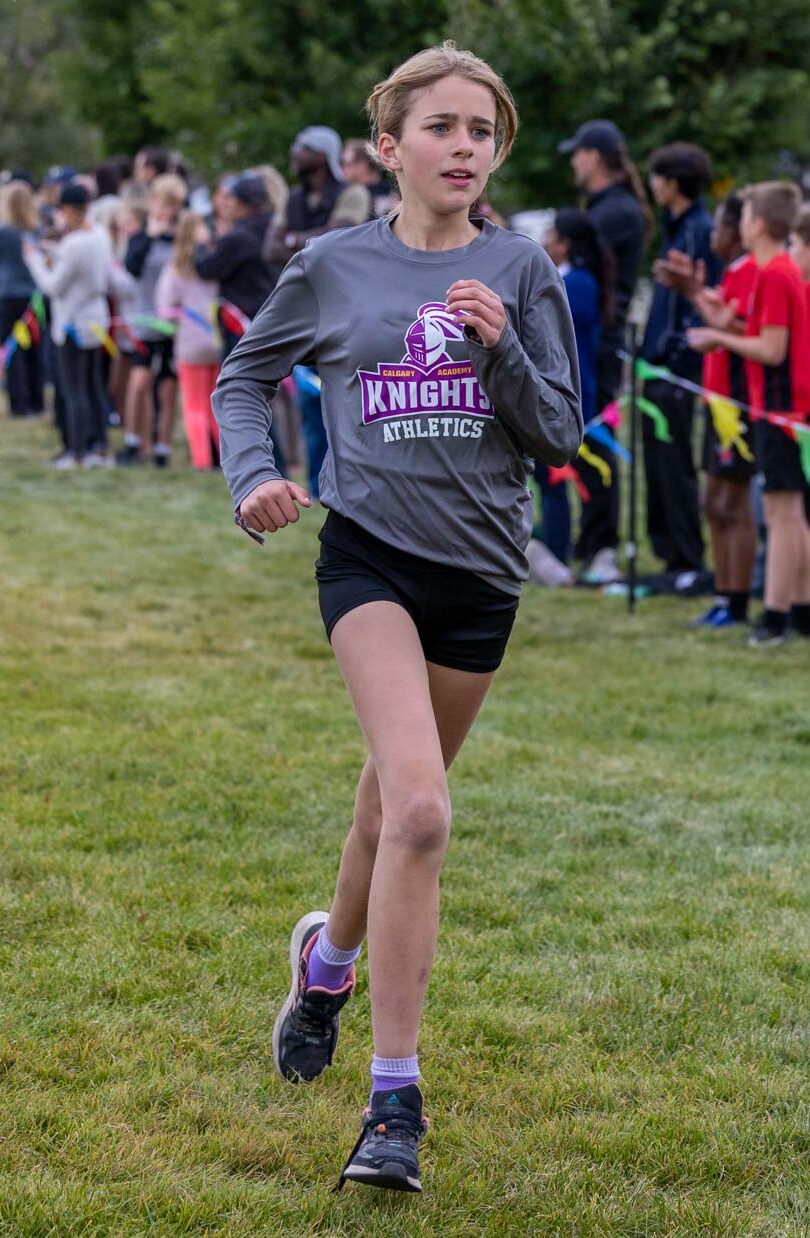Blink, and you’ll miss it—Calgary Academy’s cross-country season is quick, starting and finishing within the first few months of the school year.
Students work hard between early morning practices and the final cross-country race, learning many lessons throughout the season. When running (or life) becomes tough, a strong mind can help you overcome anything.
Individual Runners, Team-Based Sport
The origins of cross-country date back hundreds of years, with runners moving through open fields, trees, and hills as far back as the 1800s. While the sport has evolved with time, its heart has stayed the same.
Cross-country is a staple of school athletics—filling a niche for students seeking a challenge. The special qualities of the sport inspire CA teacher Jason Lindsay—the head coach for CA’s cross-country athletes.
Mr. Lindsay feels the sport challenges students in a different way. Athletes aren’t just running around a track—they navigate uneven terrain and potential obstacles.
“Athletes are on paths, grass fields, or golf courses. They’re in the school forest and going up and down hills. Sometimes, they jump over a fence or go through a river. Cross-country races have unpredictable elements, and that differentiates it from other sports.” – Mr. Lindsay
Something spectators may not know is that cross-country is a team sport. While student-athletes run individually, they score points as a team. Each runner’s placement adds to an overall team score.
Runners don’t need to worry about being first or last. They have their teammates with them—cheering each other on and waiting at the finish line for a well-deserved rest.
“Cross-country is a team-based, individual sport, and students can rely on the fact they have their teammates. While students run independently, they have people around supporting and encouraging them.”
Becoming Comfortable Being Uncomfortable
All sports teach lessons, but none are quite as unique as cross-country. Besides instilling a love of fitness, cross-country teaches athletes the value of discipline and hard work.
The shortness of the season means that students prepare for a single run compared to the multiple games and tournaments in a volleyball or basketball season. Early morning practices, balancing nutrition, and mental preparation are essential as runners train for their race—something CA teacher and cross-country coach Neil Frail reinforces with his students.
“This might be the first time some students have had to do something like this—prioritizing their nutrition and exercise over a short period of time.
Early morning runs three days a week are not easy. Our students are setting a goal for themselves and sticking to it.” – Mr. Frail
A bit of an Ironman himself, Mr. Frail sees the cross-country season as a test of mental resilience. No matter how trained a runner is, they will become tired, but staying focused on the finish line will help them reach their goal.
 “Some students are running up to six-kilometre races… that’s a long time to spend in your own head, especially if you’re physically tired. I think cross-country teaches students to be comfortable with being uncomfortable. It’s such a valuable skill that transfers to other places in life.”
“Some students are running up to six-kilometre races… that’s a long time to spend in your own head, especially if you’re physically tired. I think cross-country teaches students to be comfortable with being uncomfortable. It’s such a valuable skill that transfers to other places in life.”
One CA student, Brianna R., has learned many lessons this cross-country season. Seven a.m. practices have paid off, with her finishing tenth in her age bracket at the season’s cross-country race.
During the race, Brianna’s eyes focused on the heels of other runners as she paced herself through CA’s surrounding forest, waiting for the perfect moment to pass and move up a position. Her day concluded with a full sprint to the finish line, cutting through the sound of a cheering audience.
Brianna understands the importance of focus during a race—keeping herself motivated through self-encouragement.
“I just tell myself, ‘you’re almost there, and you got this.’ I encourage myself to keep going. If I have a cramp or something, I’ll jog slower and take deep breaths to breathe through it.” – Brianna
No matter what place a student finishes their race, they leave with an important message. Everyone becomes uncomfortable at some point, whether it’s in school, work, sports, or life. What’s important is to keep moving forward, one step at a time.
While students ran across the finish line after two days of racing at the school, they have more kilometres to run. League and zone championships will occur in the next few weeks, with the potential to compete provincially at the end of October.
